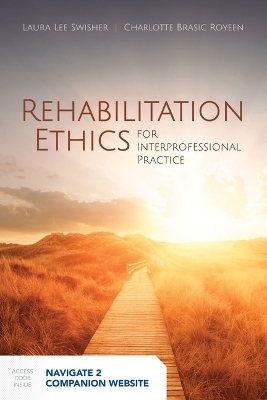
Rehabilitation Ethics For Interprofessional Practice
Seiten
2019
Jones and Bartlett Publishers, Inc (Verlag)
978-1-4496-7337-6 (ISBN)
Jones and Bartlett Publishers, Inc (Verlag)
978-1-4496-7337-6 (ISBN)
Rehabilitation professionals need to be grounded in moral principles in order to meet the needs of patients and effectively collaborate in interprofessional healthcare teams. Rehabilitation Ethics for Interprofessional Practice introduces a common language and theory for interdisciplinary ethics education and practice while establishing a moral foundation and guiding readers in how to put ethical principles into action.
The text begins by describing the moral commons, a framework for ethical deliberation characterized by mutual respect for personal and professional identity, common language, inclusion of relevant stakeholders, and the dialogic process. The authors then describe the Dialogic Engagement Model (DEM), gives professionals a structure and space for learning and understanding within their teams as they strive to provide ethical patient care.
Rehabilitation Ethics for Interprofessional Practice is forward-looking, grounded in both theory and practice. A resource for faculty and students across the rehabilitation sciences, it translates ethical principles into simple units that rule-based, ends-based, virtue-based, and narrative-based. It also focuses on:
•Developing ethical comportment—not just beliefs and decisions, but also dispositions and actions
•Embodying the moral standards of practice: humility, respect, openness, curiosity, honesty, and more
•Cultivating engaged relationships in rehabilitation practice
The text begins by describing the moral commons, a framework for ethical deliberation characterized by mutual respect for personal and professional identity, common language, inclusion of relevant stakeholders, and the dialogic process. The authors then describe the Dialogic Engagement Model (DEM), gives professionals a structure and space for learning and understanding within their teams as they strive to provide ethical patient care.
Rehabilitation Ethics for Interprofessional Practice is forward-looking, grounded in both theory and practice. A resource for faculty and students across the rehabilitation sciences, it translates ethical principles into simple units that rule-based, ends-based, virtue-based, and narrative-based. It also focuses on:
•Developing ethical comportment—not just beliefs and decisions, but also dispositions and actions
•Embodying the moral standards of practice: humility, respect, openness, curiosity, honesty, and more
•Cultivating engaged relationships in rehabilitation practice
Laura L. Swisheris aProfessor and Director of Physical Therapy and Rehabilitation Sciences in the School of Physical Therapy and Rehabilitation Sciences at the University of South Florida in Tampa, Florida. Charlotte Brasic Royeenis an A. Watson Armour III Presidential Professor and Dean in the College of Health Sciences at Rush University in Chicago, Illinois.
| Erscheint lt. Verlag | 2.4.2019 |
|---|---|
| Verlagsort | Sudbury |
| Sprache | englisch |
| Gewicht | 397 g |
| Themenwelt | Medizin / Pharmazie ► Medizinische Fachgebiete ► Chirurgie |
| Medizin / Pharmazie ► Physiotherapie / Ergotherapie ► Rehabilitation | |
| Studium ► Querschnittsbereiche ► Geschichte / Ethik der Medizin | |
| ISBN-10 | 1-4496-7337-6 / 1449673376 |
| ISBN-13 | 978-1-4496-7337-6 / 9781449673376 |
| Zustand | Neuware |
| Haben Sie eine Frage zum Produkt? |
Mehr entdecken
aus dem Bereich
aus dem Bereich
Die Geschichte eines Weltzentrums der Medizin von 1710 bis zur …
Buch | Softcover (2021)
Lehmanns Media (Verlag)
17,95 €
Krankheitslehren, Irrwege, Behandlungsformen
Buch | Softcover (2024)
C.H.Beck (Verlag)
39,95 €


